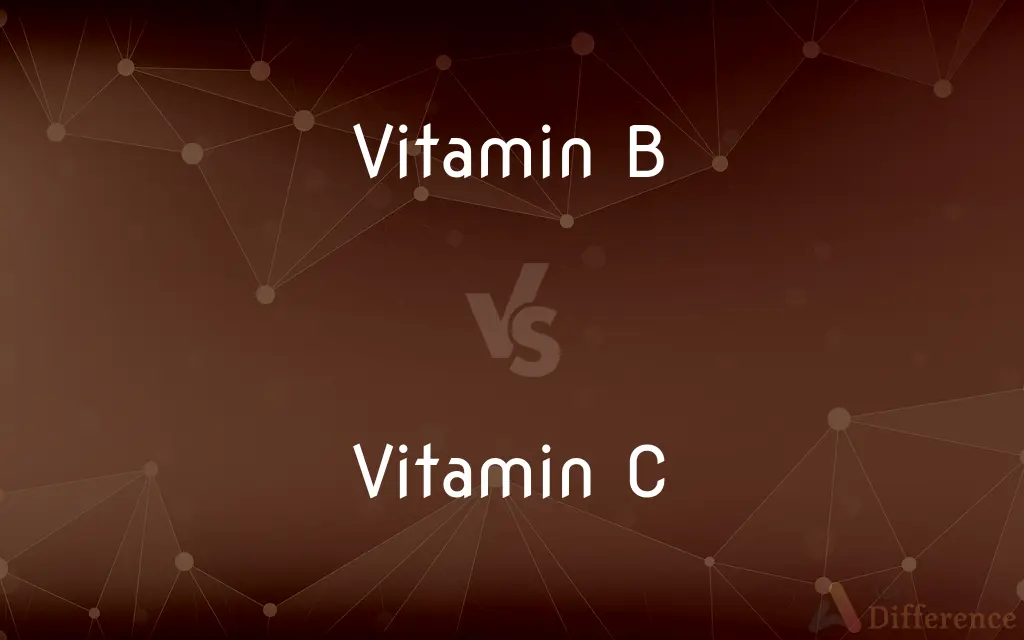Vitamin B vs. Vitamin C — What's the Difference?
By Tayyaba Rehman — Published on January 11, 2024
Vitamin B refers to a group of essential vitamins crucial for energy metabolism and neurological health, while Vitamin C, also known as ascorbic acid, is important for immune function, skin health, and wound healing.

Difference Between Vitamin B and Vitamin C
Table of Contents
ADVERTISEMENT
Key Differences
Vitamin B encompasses a group of eight water-soluble vitamins, each with unique roles, particularly in energy metabolism and nervous system health. Vitamin C, also water-soluble, is primarily known for its role in immune function, collagen synthesis, and as an antioxidant.
Deficiency in Vitamin B can lead to various issues like anemia, fatigue, and neurological problems. Each B vitamin (like B12, B6) addresses specific health aspects. Vitamin C deficiency, famously resulting in scurvy, impacts skin health, wound healing, and immune resistance.
Dietary sources of Vitamin B vary: B12 is found in animal products, while others like B6 are in nuts, bananas, and potatoes. Vitamin C is abundant in citrus fruits, berries, and vegetables like bell peppers and broccoli.
Vitamin B vitamins are key in breaking down carbohydrates, fats, and proteins for energy. Some, like B12, are vital for producing red blood cells. Vitamin C is essential for synthesizing collagen, enhancing iron absorption, and protecting cells from oxidative damage.
Supplementation of Vitamin B is common for those with dietary restrictions (like vegans for B12) or specific health conditions. Vitamin C supplements are popular for general health, particularly for boosting the immune system and skin health.
ADVERTISEMENT
Comparison Chart
Type
Group of 8 water-soluble vitamins
Single water-soluble vitamin
Primary Functions
Energy metabolism, nervous system health
Immune function, collagen synthesis
Common Deficiency Symptoms
Anemia, fatigue, neurological issues
Scurvy, poor wound healing, immune weakness
Dietary Sources
Animal products, nuts, grains
Citrus fruits, berries, vegetables
Key Role in Body
Metabolizing nutrients, red blood cell production
Collagen formation, antioxidant, iron absorption
Compare with Definitions
Vitamin B
Obtained from varied dietary sources.
Leafy greens are a great source of various Vitamin B types.
Vitamin C
Essential for immune system function.
Regular intake of Vitamin C helps boost your immune system.
Vitamin B
Includes several types, each with unique benefits.
Vitamin B6 aids in mood regulation and brain health.
Vitamin C
Important for collagen synthesis and skin health.
Vitamin C aids in healing wounds and maintaining healthy skin.
Vitamin B
Essential water-soluble vitamins for energy metabolism.
Eating whole grains provides necessary Vitamin B for daily energy.
Vitamin C
Enhances iron absorption in the body.
Consuming Vitamin C with iron-rich foods improves iron absorption.
Vitamin B
Vital for neurological function and health.
Vitamin B12 is crucial for maintaining healthy nerve cells.
Vitamin C
Acts as a potent antioxidant.
The antioxidant properties of Vitamin C protect cells from damage.
Vitamin B
Essential for red blood cell production.
A lack of Vitamin B12 can lead to anemia.
Vitamin C
Found in citrus fruits and vegetables.
Oranges are a well-known source of Vitamin C.
Common Curiosities
What is Vitamin B?
A group of essential water-soluble vitamins important for various bodily functions.
Can Vitamin B help with energy?
Yes, it's crucial for metabolizing nutrients for energy.
What is Vitamin C?
A water-soluble vitamin known for its role in immune function and skin health.
Are there different types of Vitamin B?
Yes, there are eight different types, each with specific roles.
Is Vitamin C good for the immune system?
Yes, it's essential for maintaining a healthy immune system.
Does Vitamin C help with wound healing?
Yes, it's vital for collagen synthesis and skin repair.
What are common sources of Vitamin B?
Meats, dairy, nuts, and whole grains.
Do vegetarians need Vitamin B supplements?
They might need supplements, especially for Vitamin B12.
What foods are high in Vitamin C?
Citrus fruits, berries, and many vegetables.
Can Vitamin B deficiency affect mood?
Yes, especially deficiencies in vitamins like B6 and B12.
Can excessive Vitamin C intake be harmful?
High doses can cause gastrointestinal discomfort but are generally safe.
Should pregnant women take Vitamin B?
Yes, particularly folic acid (Vitamin B9) for fetal development.
Is Vitamin B important for brain health?
Yes, certain B vitamins are key for neurological function.
Does Vitamin C prevent colds?
It can reduce the severity and duration but not prevent colds.
Can smokers benefit from extra Vitamin C?
Yes, as smoking increases oxidative stress and Vitamin C needs.
Share Your Discovery

Previous Comparison
GET Method in HTML vs. POST Method in HTML
Next Comparison
Linear Regression vs. Logistic RegressionAuthor Spotlight
Written by
Tayyaba RehmanTayyaba Rehman is a distinguished writer, currently serving as a primary contributor to askdifference.com. As a researcher in semantics and etymology, Tayyaba's passion for the complexity of languages and their distinctions has found a perfect home on the platform. Tayyaba delves into the intricacies of language, distinguishing between commonly confused words and phrases, thereby providing clarity for readers worldwide.












































